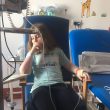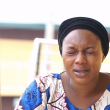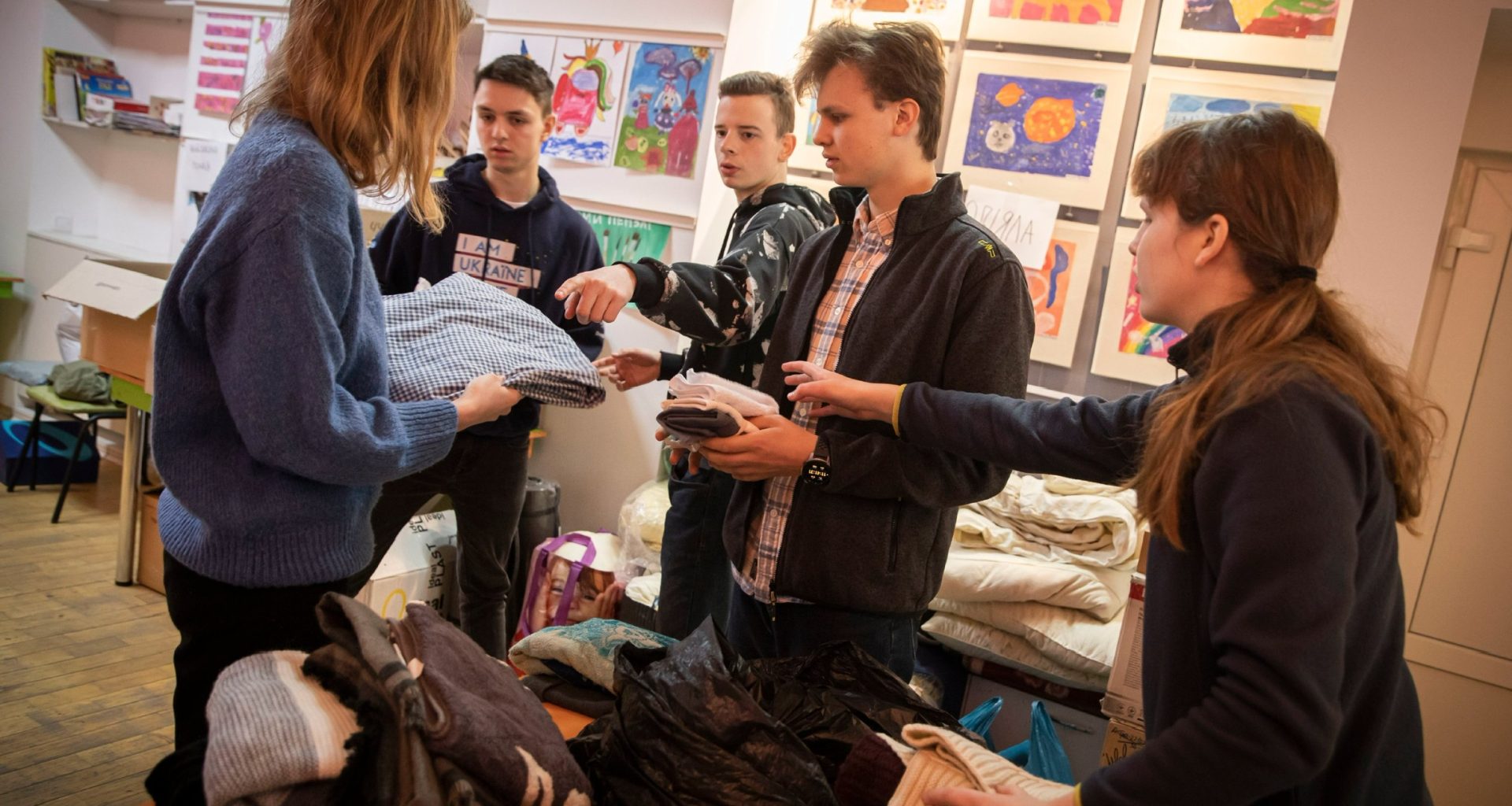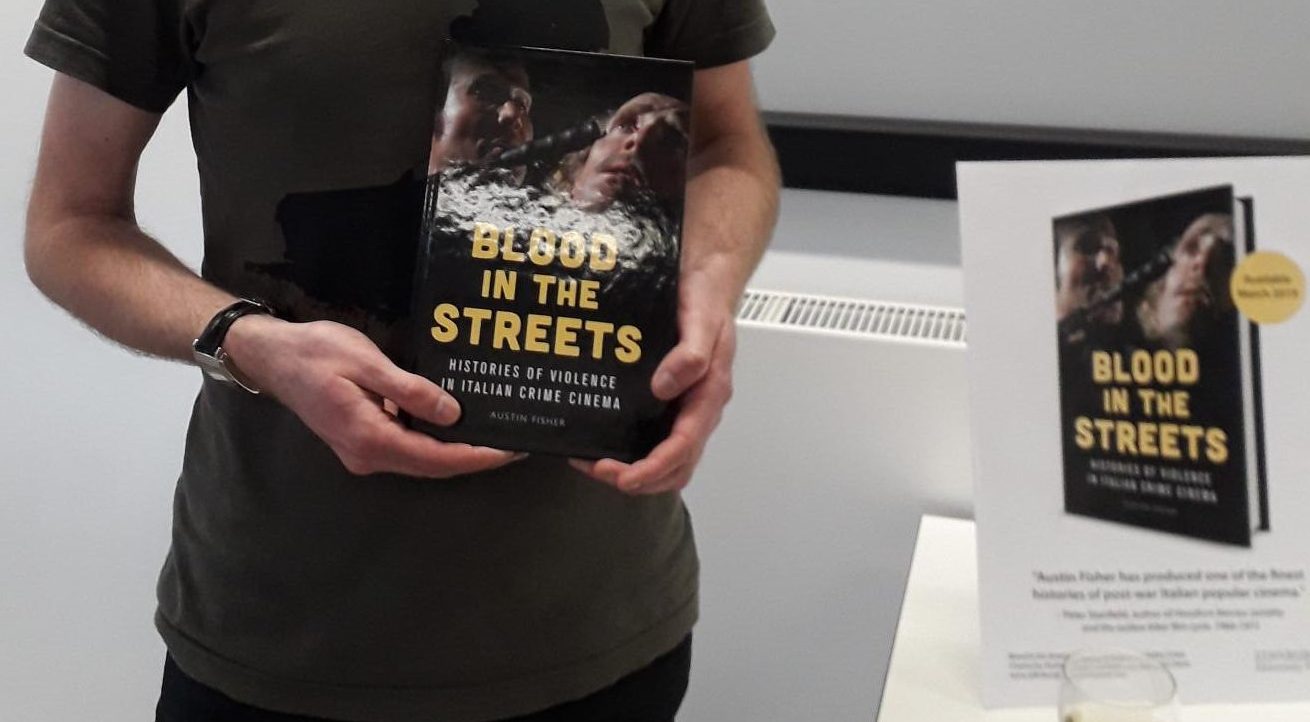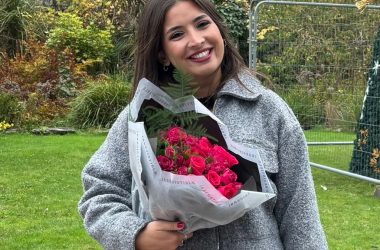Under the warm yellow light of a kitchen lamp in Lithuania, a family from Ukraine sat around the table to eat. A chair scraped across the tiled floor with a sudden rumble and three-year-old Milena (name changed to protect her identity) ducked down, covering her little ears with chubby hands. With her baby face scrunched in terror, as she frantically tried to hide from the noise.
Days ago, she was huddled like this in a dark basement in Bucha, Ukraine. Several families bundled together in winter coats to protect themselves from the chill of the earth, without water. A singular bulb illuminated a desperate game of rock-paper-scissors conjured up as a distraction for the little girl, her giggles of victory against her middle-aged opponent drowning out the distant thud of shells blanketing the ground far above.
After several days of running from the war – with only a passport and a small bag bearing the remnants of their past lives – Milena and her grandmother crossed through Poland to arrive into Lithuania. Safe now in Vilnius, Valentina, 64, cradles her granddaughter in her arms as she speaks: “You understand, our city has been wiped off the face of the earth – bombed completely.”
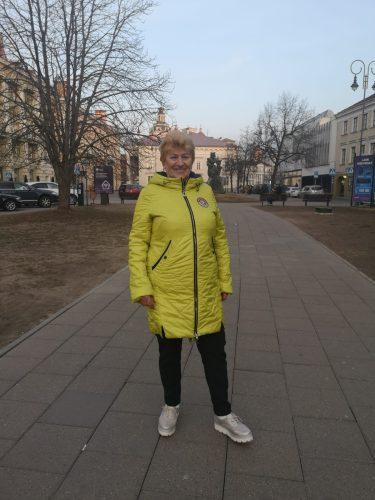
“How can you explain [to the child] what is happening? How do you explain the siren sounds, the bombs, the explosions?”, she dolefully continued. Valentina recounted how they tried to alleviate Milena’s fears she told her the bursts were fireworks.
“You know she suffered a lot of trauma… the first couple of days [in Vilnius] were very difficult, if something fell or there was a loud noise, a siren outside, she would get really scared.” She continued.
Despite their new-found safety in the Baltic state, Valentina and her family are still plagued with uncertainty, mainly because she had to leave her husband behind in Bucha, which is now occupied by Russian forces.
“My husband is still there and I have absolutely no contact with him right now, I don’t even know if he’s dead or alive.“
She spoke proudly of his resolution to stay behind, despite of the opportunity to evacuate. When questioned on his reasoning, her bittersweet reply revealed the breadth of his character:
“He’s a man, he said he will protect our home, he didn’t want to leave.”
Heart-broken and afraid of being shot, or captured and raped, as nine women cramped into one passenger car to drive to the Polish border, Valentina recalled: “when there’s shelling, as it was happening all around us, and people dying, in times like that, you don’t think about anything, the most important thing is saving the children. It was all very fast and spontaneous, that’s how we ran. And all around us constant sound of shelling.”
Valentina’s story of indiscriminate bombardment, of running, is one echoed again and again across the lives of her fellow countrymen. Since Russian troops and tanks crossed over into Ukrainian soil and began cutting bloody swathes through the territory, over 10 million people – 1 in 4 Ukrainians – have fled their homes, and their old livelihoods, to escape raining death.
“My husband is still there and I have absolutely no contact with him right now, I don’t even know if he’s dead or alive.“
In total, 6.5 million people have been internally displaced within Ukraine whilst 3.5 million have left the country completely.
They travel by any means necessary, but it is the railways – the steel tracks that criss-cross the prairie-flat landscape of Ukraine – which are lifelines for the fleeing diaspora of the war-ravaged east. These trains, packed full with the grim visage and trauma of destruction, head towards western cities like Lviv and to dreams of succor.
Only 70km from the border with Poland, Lviv is known as a haven of Ukrainian culture and spirit but with the invasion it has undergone a metamorphosis: it is now both a refuge and the starting line of a greater journey across the continent.
With its native population ballooning within the span of a month, Lviv’s citizens – like Markiian Kobyletskiy, a political science student – sit shoulder-to-shoulder with people from Kyiv; from Kharkiv; from Mariupol. Studies disrupted and now working as a fixer for news agencies, Markiian claims proudly that: “Everybody wants to support refugees.”
The city council has welcomed over 200,000 displaced people, turning over its cultural institutions such as the Les Kurbas Theatre as accommodation. But more come and go from the city daily, mostly women and children, stopping briefly for a reprieve before moving onwards via rail to Poland. “A lot of men stay here, because men aren’t allowed to go because they are militarily obliged to stay in Ukraine. So they stay here, and their family goes to the West.”
For refugees, Lviv has become a ‘safe’ harbour. Its position far in the west means it is isolated from the frontlines and relatively untouched by material fighting. Still, the shadow of war looms over the minds of its residents new and old alike.
“Psychologically, I just prepare myself that it [the war] can take half a year, it can take longer, so we need to gather our emotional resources and our physical resources and be ready to fight for the long term,” says Markiian, who has witnessed Lviv’s preparedness for coming battles on walks through the streets and blocks of the city, “whilst we do also need to get back to normal lives, and return to our routines, we need to be prepared for long bloody war.”
Ordinary citizens are joining the Territorial Defence Force for military and medical training, lining up in city squares to sign up for self-defense lessons, and Lviv is ringed by barricades, “steel hedgehogs” and checkpoints at its entrance and exits. Although he currently has not joined the military, and concentrates on helping journalists and providing humanitarian efforts, Markiian is ready to take up arms if Russian forces advance to Lviv’s doorstep. Abandoning his home is out of the question: “I don’t want to leave Lviv – it’s my home town, it’s my country – and I think we need to defend it.” Markiian harkens back to western Ukraine’s long history of resistance against Soviet and German oppression in the 20th century: “We in Lviv, we are raised up on these stories, we know them well, and I think we will fight as if our ancestors were beside us.”
Whilst Markiian is obliged to stay and fight, other Ukainians make the hard decision to flee. Every person who crosses the border is like a drop of blood lost from the body of the nation: “I’m really sad when one of my friends leaves Ukraine because, truly our country needs them, and I really hope they will return after our victory because we need to rebuild this country. I think Putin will win really if our people stay in Europe and this land is not reclaimed.”
The anguish of abandoning your home soil is an emotion hard to pin down. Those weary travellers that are dropped off at the Polish-Ukrainian border alongside countless other – their individuality lost in a mass of desperate humanity – experience (and will go on to experience) countless traumas: terror, heartbreak, frustration, rage, exhaustion.
But there is relief waiting for Ukrainians.
In the train stations of Polish border towns like Przemyśl, the collective warmth of Poland and Europe gathers: from hot cooked meals to teddy bears for Ukrainian children. Przemyśl has become, overnight, the epicentre for international aid and the face of the world’s humanitarian response. Valentina recalls the moment she was welcomed and embraced: “When we just crossed the border into Poland it was so touching, tears were streaming down my face, we were so welcomed. Our bags, our things, they helped us with them immediately. They put out these tables with water, juice, tea , coffee, sugar, and toys for the kids, and clothes, and they offered it all to us. It was so unexpected.”
“Everybody is traumatised because their husbands, dads, etc. are all still fighting. You know, there’s no males in the – there are only elderly males – in the [refugee] centres. The kids are traumatised.”
John Lawler, an aid worker from the UK and founder of the Make a Difference foundation, is one of those volunteers who might have greeted Valentina. Lawler traveled to Przemyśl alongside his wife Kari and friends. As soon as they arrived, they got to work offering help by recognizing and filling a gap in refugee aid.
John said: “Most people come in the night because they see it as more safe. Every few days, there’s a big group with lots of numbers and then it’ll be smaller numbers that kind of come through in between, and certainly when they arrive at the centre, they’re getting off buses exhausted. People are crying. They are trying to leave Przyseml to wherever they need to go. Everyone’s just trying to find a way to get where they are going to be, where they want to be in the next months and potentially years ahead.
“They are coming with next to nothing. They haven’t got the money to get transport direct. There’s trains and buses, but they’re all packed, everybody’s traumatised and they don’t want to get on a bus again. We’re sort of the ‘last mile’, we’re the sort of point-to-point where there is no transport direct, and so we just focused on this and we realised it was a need.”
Their campaign is called Operation Safe Drop and through transporting Ukrainian women and children to their last destination, John and the colleagues on his team have experienced firsthand the plight of refugees, seen the nervousness and the myriad other emotions etched on their faces and within the whites of their eyes. “Everybody is just exhausted,” said John, “everybody is traumatised because their husbands, dads, etc. are all still fighting. You know, there’s no males in the – there are only elderly males – in the [refugee] centres. The kids are traumatised. Their bringing their pets along: cats, dogs, hamsters, all being brought in small bags. And they just want to get somewhere stable. They want to get out of the [refugee] centres. I mean, they all want to get back to Ukraine. They all want it to stop. But in the meantime, they just want to get out of the centres and just have somewhere else until this is all over.”
The numbers that arrive and depart Przemysl are huge, bus and trainloads churn out crowds: all of them looking for help, all of them needing something. It is a delicate and fragile operation, with towns like Pryzemysl struggling under the weight of need and expectation: it must be both a camp, transport hub, a staging ground, a donation point, a hospital, and a logistics centre. But through the perseverance of volunteers, the humanitarian machine runs on.
It is the collective psychological trauma of Ukrainians that is the most difficult, and perhaps impossible, to solve. “You do need to step away and have a breather,” says John. The weight of that trauma shifts, and suddenly it is relief workers like him and his wife who carry that burden too: “My wife Kari, she’s here and she speaks Russian and she’s overhearing women at the centre calling their husbands in Ukraine. And so while most people wouldn’t understand what’s being said, she’s picking up everything that’s happening, and to hear those sorts of things can be quite traumatic and there were certainly tears.”
One crisis psychologist, despite being trained in dealing with traumatic situations, recollected his first thoughts as he realised his city was under attack. “It’s like a nightmare. Everything starts to move slowly and you just want to wake up.”
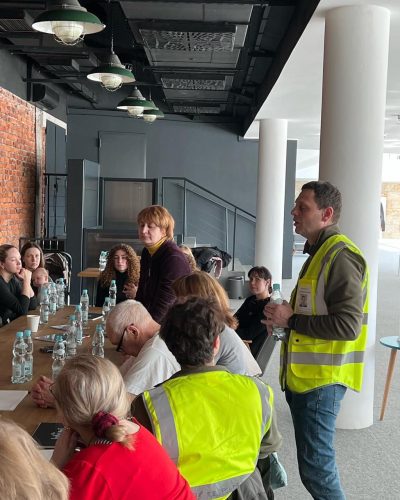
Alexander, 48, left Odessa in the early hours of the 24th of February. Startled from his sleep by the echo of an explosion, he recalled: “At 5.23 in the morning we heard a massive blast. I jumped out of my bed, ran to the window, and my wife said, what was that?”
Fixated on the hour and minute his life was changed forever, continued:
“At 5.23 am in the morning it’s the time when the whole city sleeps, and you hear a sudden blast. I said its either terrorist attack or it was a missile attack. I thought, in either case, it was a bad thing which is why I started organising my family and friends, I called them, I ran down to check whether my car had fuel.
“We drove to a gas station at 5.45 am and there was a huge queue, like 300 metres, and within seconds it was like 500 metres. We were queuing for something like an hour.”
As some of the first out of the country, they did not encounter any crisis support on the border on that first day. But after spending the night in Moldova, Alexander returned to the border with the aim of helping fellow Ukrainians in their evacuation. In a similar manner of gratitude for the support shown by neighbouring states, he described the “dozens of volunteers” who had organised to ease the journey.
“We had tremendous support, people were giving their places for free. For example we went for pizza and people saw Ukrainian licence plates. They told us ‘no no no we are not gonna charge you’, I said no please take money because within weeks you will see those people who are really in need, we are not in need.”
For refugees, help comes not just at the border. In Berlin, Sofia Somorodova has found a place to stay: “Me and a friend have found a place to stay in Berlin for a long time. Our hosts are so kind. I have friends here, I have acquaintances, I had a place to stay before the registration, before all the bureaucratic process, but everyone’s been so kind to us, so helpful, and me and my friend know English and it was so easy to communicate like every question, and there were even some helpers in Russian and Ukrainian.”
Yet Ukrainian refugees like Sofia can never truly escape the war, for it is reflected on the black mirror of their smartphones and endless social-media feeds: “The first week, when I had already gotten into Hungary and Poland, was really tough, because I spent 14 hours a day scrolling the news and consuming everything that is out there. That was extremely hard and when I first saw Kharkiv, as I’m from Kharkiv, on some of the days the central square of Kharkiv was bombed by rockets, when I saw that video my heart just tied up. So yeah, the first week I cried a lot because I was seeing all the photos and videos and now I just feel this deep pain about my native city of Kharkiv and the city which I love, which is Kyiv.”
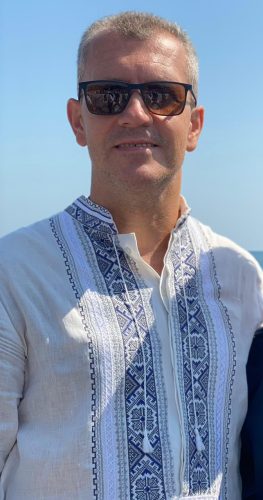
“I see myself living my whole life in Ukraine, the only question is when I will be able to come back. If the war continues for another year or two, I will have to restart my education in Germany. I would have to learn the language.” Despite preparing to adjust to a new life elsewhere, like most Ukrainians, Sofia’s heart and mind still belongs to the blue-and-yellow flag: “There is so much uncertainty about whether the war will finish tomorrow or in two years, I should to take some actions about that. But I will definitely get back to Ukraine one day.”
For others, however, leaving the country as a refugee was never an option on the matter of principle. Back in Odessa, Yuri, 47, is part of the volunteering effort, collecting humanitarian aid as it comes in from Europe to distribute it for those who have yet to make their escape. He also actively participates in providing the territorial defence battalions stationed around cities with food and supplies. Accustomed to the air raid sirens that sound several times a day, he said: “everyone is needed, every individual has a place in this fight, some on the frontlines, some in the rear providing support – it is our duty, it is our country”



